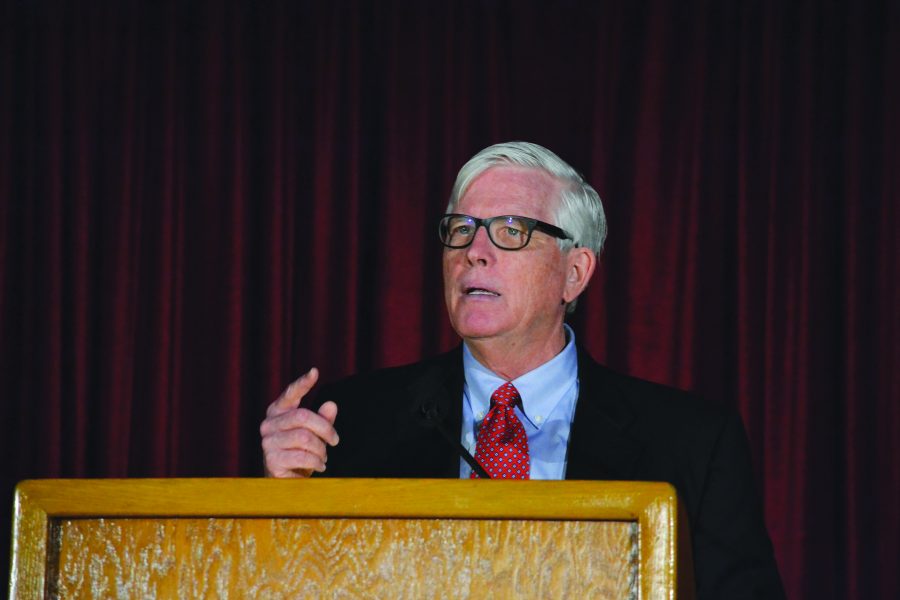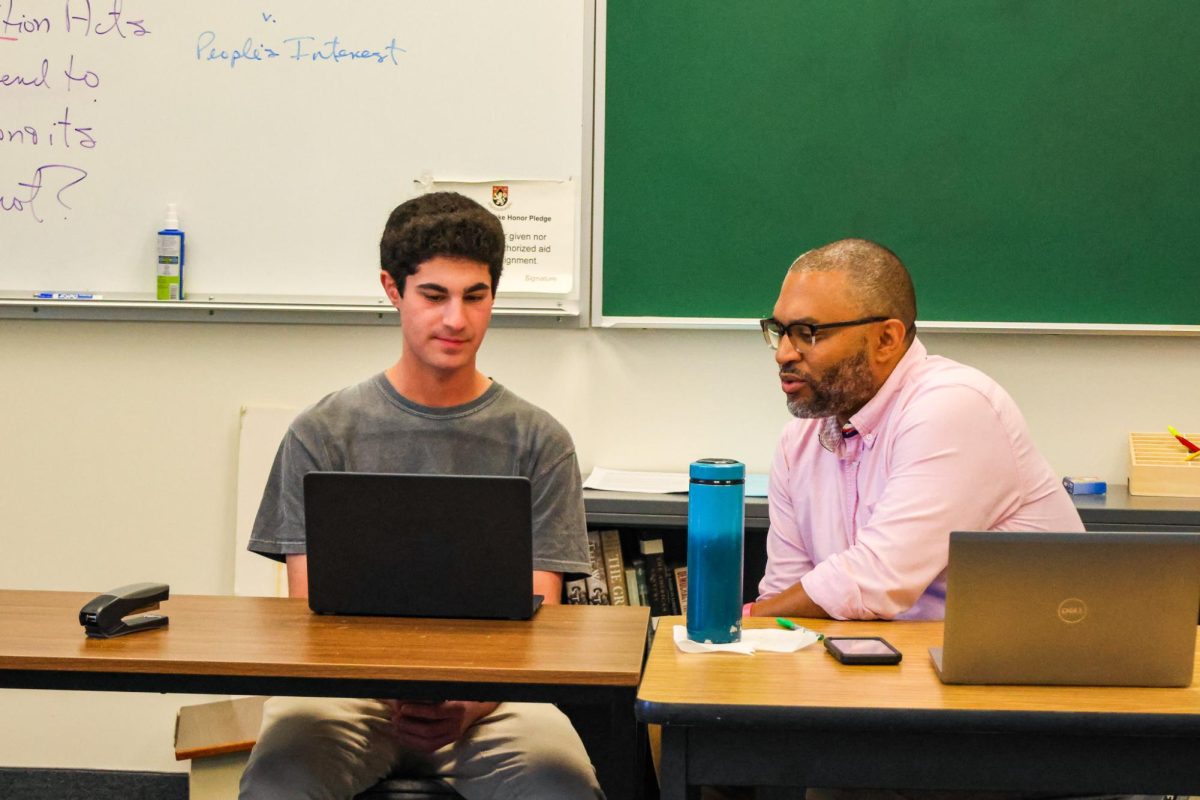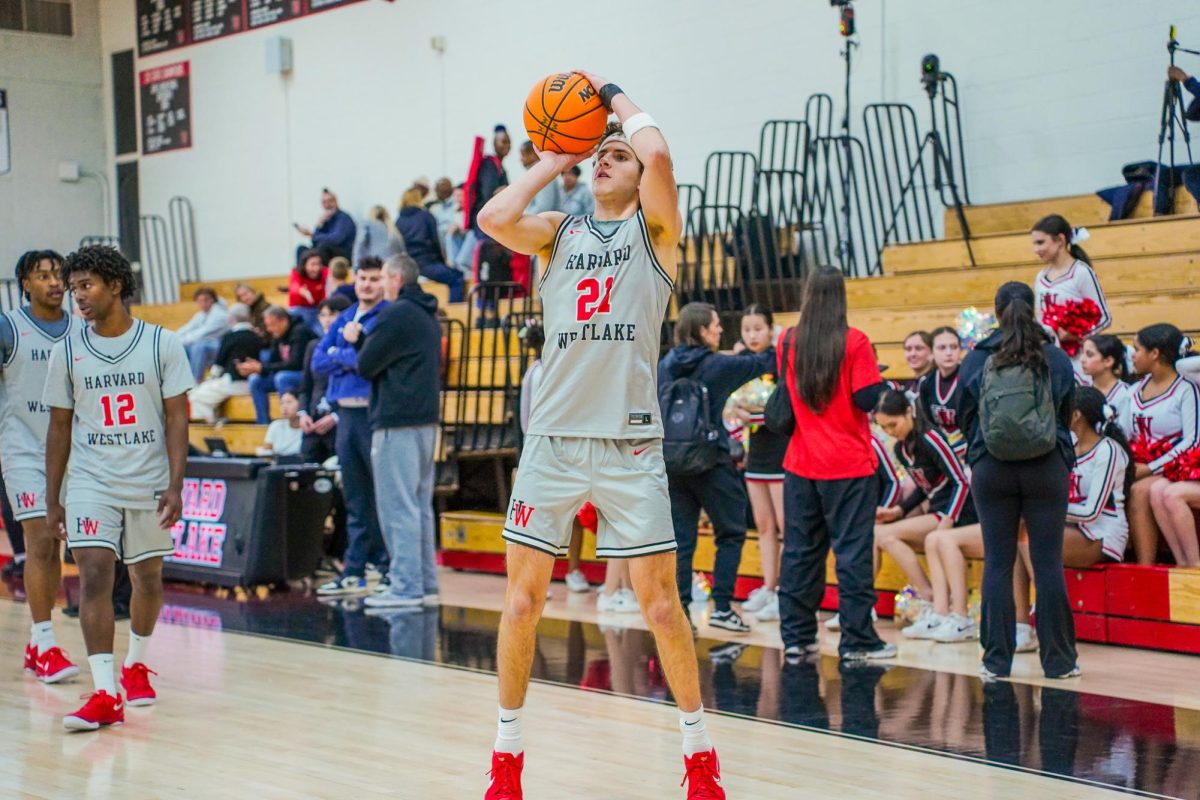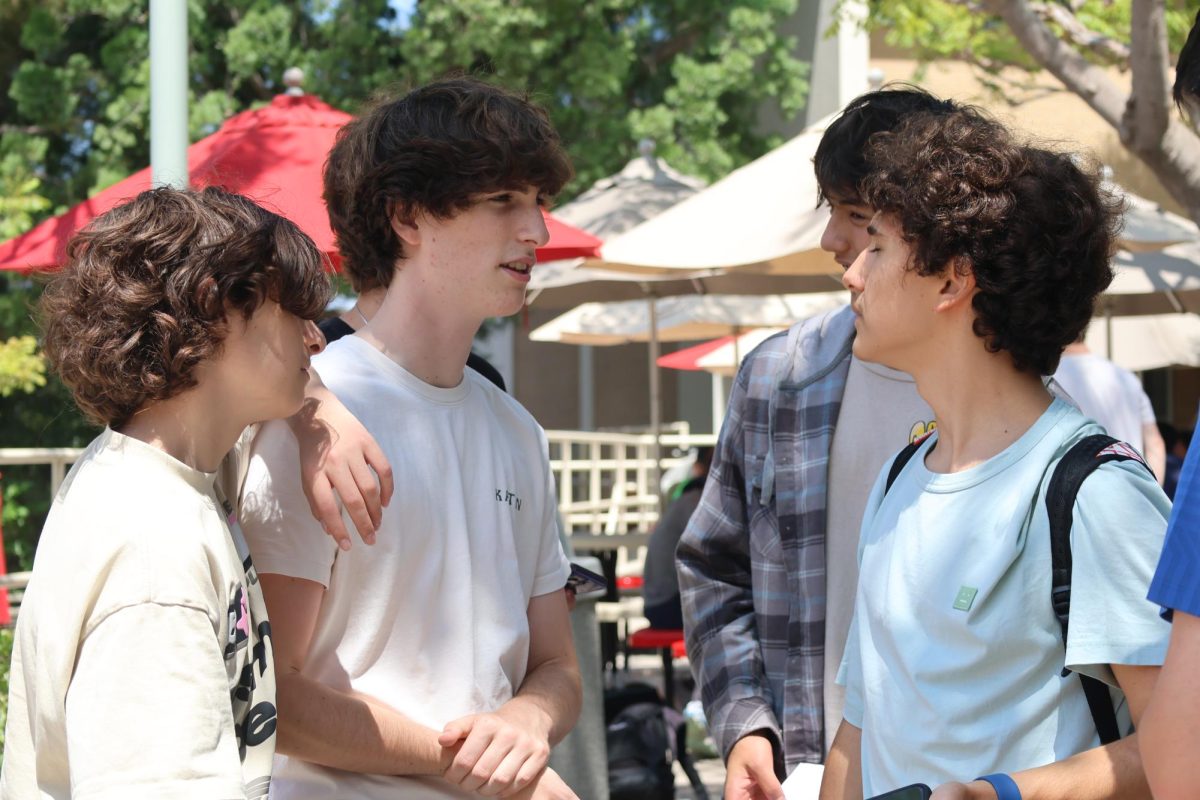Conservative radio talk show host Hugh Hewitt shared the keys to finding happiness as outlined in his book, “The Happiest Life” in an all-school assembly Nov. 6.
A lawyer, author, Chapman University law professor and Emmy award-winning broadcast journalist, Hewitt appears regularly on CNN, Fox News Network and MSNBC. His radio show on MSNBC, “The Hugh Hewitt Show,” has an estimated weekly audience of around two million, according to his website hughhewitt.com.
“I would advise you all to go and start asking questions,” Hewitt said in his assembly speech. “It’s going to be an essential ingredient to a happy life—to be able to engage with and find out what you have in common with someone.”
In referencing his book, he discussed the seven “ingredients” of a happy life: encouragement, enthusiasm, energy, empathy, generosity, graciousness and gratitude. He talked about his best friend, son’s godfather and college roommate Mark Gearan, who was also Bill Clinton’s campaign chief of staff. Hewitt also emphasized the importance of forming human connections despite differing political opinions.
“He’s been wrong since the day he was born, but I love him and I trust him with my family,” Hewitt said. “I believe it’s the greatest necessity to recognize humanity opposite you on political issues. You have to absolutely go out of your way and have decency and collegiality with people with whom you have no common ground with politically.”
Students had the opportunity to ask questions following his speech.
In response to a student question about public protest, Hewitt said he does not support athletes, such as those in the NFL kneeling for the national anthem.
“I draw the line at the national anthem,” Hewitt said. “I do not believe people should kneel during the national anthem because there are men and women [fighting for our country] who are in harm’s way and I know a lot of them who were killed. I do not believe the athletes fully comprehend how deeply upsetting it is to military families what they’re doing.”
After the event, students voiced mixed reactions regarding Hewitt’s speech. According to a Chronicle poll of 265 students, 84 percent said Hewitt’s speech was not what they expected. 56 percent said they learned something from the assembly.
President of the Harvard-Westlake chapter of the Young Americas Foundation Natalie Winters ’19, YAF vice president Will Berlin ’19 and Amanda Chan ’19 introduced Hewitt before the event. Berlin said he appreciated that the speech was not excessively political.
“Concepts like happiness are more applicable to the entire school in terms of self-improvement,” Berlin said. “Not overly hitting you in the face politically is something that’s really nice, especially when the [entire] community is forced to go.”
49 percent of 263 students who responded to the Chronicle poll think Hewitt should have discussed his political opinions more than he did.
“It actually would have been much more beneficial for Hewitt to talk about politics because he is a really good example of a conservative who is just undeniably incredibly informed,” Sophie Levy ’18 said. “He is incredibly experienced regarding politics and he’s not part of some ridiculously extremist party. It would have been a good chance for people to see more mainstream conservative opinions in politics. That opportunity was missed in favor of kind of vaguely trying to have more of a peaceful message.”
Director of Student Affairs Jordan Church, who is a member of the all-school assembly speaker selection committee, said the administration did not tell Hewitt what he couldn’t say, but rather encouraged him to talk about happiness.
“We did not tell Hugh Hewitt what he couldn’t do,” Church said. “We told him what we wanted him to do. We didn’t say, ‘Don’t talk about politics.’ We said, ‘This is what our community needs the most. We like your happiness book and we want you to focus on happiness.’”
Church said Hewitt’s message of happiness aimed to connect students.
“In this political climate, with the negative media coverage that we have, how do you find happiness in that environment?” Church said. “He did focus on his happiness book and how to find happiness, and to me that’s important. He’s both in the political sphere and also in the media sphere and that echo chamber can bring sadness.”
The assembly committee of eight faculty and staff members works to bring speakers who will share interesting stories and can connect with the student body, Church said.
After receiving speaker proposals from members of the school community, the committee selects two speakers for each semester. Last spring, members of the school community proposed four speakers. The committee chose 2014 Los Angeles Poet Laureate, author and activist Luis Rodriguez and Hewitt as the first semester all-school assembly speakers.
Following the selection process, the committee reaches out to the chosen speaker.
“We’ll call them up and give them a little background on our school and what we’re like because we want them to have context,” Church said. “Ultimately, what’s big for me is helping them try to find a universal message that anyone in the audience can connect to.”
Church said the administration endeavors to support students’ differing opinions while also upholding the school values of inclusion. Hewitt said silencing certain voices is a significant problem, especially in educational institutions.
“All universities, colleges and schools ought to be inviting all different points of views so that students hear the full spectrum of ideas and can decide for themselves,” Hewitt said.
Levy said she is in favor of a future conservative speaker more directly discussing politics as long as that doesn’t include expressing hateful views.
“As far as conservative speakers coming on campus, I don’t mind one coming at all,” Levy said. “And I guess this could apply to the far far left, to be fair, but at the same time, it’s just undeniable that the main voice of bigotry in the US right now is on the right. It’s good to have a conservative speaker on campus provided that line of bigotry is not crossed.”



































